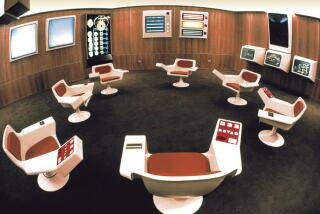Soviet PC Users Stage Own Coup : Computers: Cal State professor helped run Moscow conference on networking. Procedure was later used to send out word about the attempted putsch.
- Share via
The message was cryptic: “I’ve seen the tanks with my own eyes. . . . Communists cannot rape the Mother Russia once again!”
It flashed on the screens of untold thousands of personal computers across the globe, sent from the Soviet Union by a senior programmer at a fledgling communications network just hours after hard-line members of the Soviet government launched their failed coup attempt last month.
Hunched over a computer at his West Los Angeles home, college professor Larry Press was stunned by the message--one of the first to warn of the coup--but not by how it came to appear on his screen and others. Press, who a week before the coup was in Moscow helping run a conference on computer networking, began transcribing news reports from a Los Angeles radio station to transmit to the Soviet Union.
There, the senior programmer, Vadim Antonov, along with his wife, Polina, and a group of youthful computer experts whom Press had befriended during his trip, translated the reports into Russian and relayed the dispatches to computers in 70 Soviet cities.
The network of Soviet personal computers is being heralded as one of the crucial links of information for residents who were starved for up-to-date reports on coup activities.
“Those little PCs (linked up) 400 organizations,” Press said. “Everything from universities, research institutes--even government people.”
Press said the coup leaders, who had taken control of mass media, apparently overlooked the technological revolt taking place before them. “I guess they didn’t think (electronic mail) was mass media enough,” said Press, a professor of computer information systems at Cal State Dominguez Hills.
The Soviet computer group, dubbed Demos, is headquartered in a small building several hundred yards from the Kremlin. Its network is hooked up through common telephone lines to a computer in Helsinki, Finland, which in seconds can relay messages to other networks throughout the world, Press said. The hookup takes place about every hour.
Without Mikhail S. Gorbachev’s policy of glasnost , Press said, the link with Helsinki, made a year ago, would not have been possible. Demos, which has a staff of 70, worked around the clock during the coup to keep itself and its subscribers abreast of events.
“A lot of what went across that network was emotional support,” Press said. “It was important to them to know that they were not alone. For three days, that’s all I did was transmit information.”
The Soviet computer group also disseminated copies of the letter that Boris Yeltsin read to supporters from atop a tank, the outlawed communiques from the independent Soviet news agency Interfax, and eyewitness reports of menacing movements by the military outside Yeltsin’s headquarters.
“At the start of the coup, it was not clear who was going to win,” Press said. “They were really putting their lives on the line.”
Press said that in addition to the American media reports he sent, the Soviet group also received dispatches of BBC broadcasts transmitted by a man in Denmark. Just as frequent though, were personal, intimate messages. Press recalled a transmission from Polina Antonov, the wife of the Soviet group’s senior programmer.
“Don’t worry, we’re OK, though frightened and angry,” Polina wrote. “Moscow is full of tanks and military machines--I hate them. They try to close all mass media, they stopped (Cable News Network) an hour ago, and Soviet TV transmits opera and old movies. . . . Now we transmit information enough to put us in prison for the rest of our life.”
Michael Naimark, a San Francisco artist and researcher, like Press had been in Moscow for the computer conference, and maintained contact with the Soviets during the coup.
“On a conceptual level it was absolutely incredible that I would be sitting in my home watching CNN live from Moscow, getting simultaneously an E-mail (electronic) message written just two hours before saying ‘Help. They’ve just cut off CNN. There are tanks outside. What is going on?’ ”
On the other hand, though, Naimark said logging onto the network wasn’t much more than an everyday occurrence.
“E-mail is as much a hobby to me as a telephone is to you,” Naimark said.
Press described the members of the Soviet computer network as shrewd entrepreneurs who might someday transform the cooperative into a capitalist-style company. Already, Press said, the group has as subscribers most of the major institutions in the Soviet Union.
“The whole thing is one big piece of private enterprise,” Press said. “It is not a trivial part of the day-to-day communications structure in the Soviet Union.”
More to Read
Sign up for Essential California
The most important California stories and recommendations in your inbox every morning.
You may occasionally receive promotional content from the Los Angeles Times.













